
Climate change has become a global challenge, and as one of the major sources of greenhouse gas emissions, the green and low-carbon transformation of the transportation sector has received considerable attention. According to the latest Carbon Dioxide Emissions Report released by the International Energy Agency (IEA) in 2022, China has made significant progress in the zero-emission transformation of transportation. Compared to the global increase in emissions from the transportation sector, China's carbon emissions from transportation decreased by 3.1% in 2022. However, it should also be recognized that China still faces multiple challenges in the process of zero-emission transformation, including technological bottlenecks, operational mechanisms, and regulatory systems. It also faces a lot of uncertainties, such as how transportation and other areas such as the economy, energy, and urban development should be integrated for sustainable development, as well as the opportunities and pathways for achieving low-carbon development in non-road sectors.
In this context, the "Forum on Zero-Emission Transformation and Development of Transportation and the Annual Conference of China Clean Transportation Partnership for 2022-2023" was successfully held in Beijing on April 15, 2023. The forum gathered 30 experts from the fields of energy, climate, environment, and transportation, who were invited to deliver speeches. The event attracted nearly 130 experts, scholars, and industry practitioners from universities, research institutes, international organizations, think tanks, companies, and media, with both offline and online livestream participation. The online livestream garnered an impressive audience of over 400,000 viewers.
Keynote Address
At the onset of the conference, Yan Ding, member of the CCTP Steering Committee and Director of the State Environmental Protection Key Laboratory of Vehicle Emission Control and Simulation, highlighted in his opening speech the comprehensive nature of China's zero-emission progress in transportation, spanning across various domains including cities and the environment. While notable advancements have been achieved in recent years, the journey is not without its challenges and obstacles. With great enthusiasm, he extended a warm welcome to both familiar and new attendees, encouraging them to convene and delve into profound discussions on the development of zero-emission transportation and its associated issues.
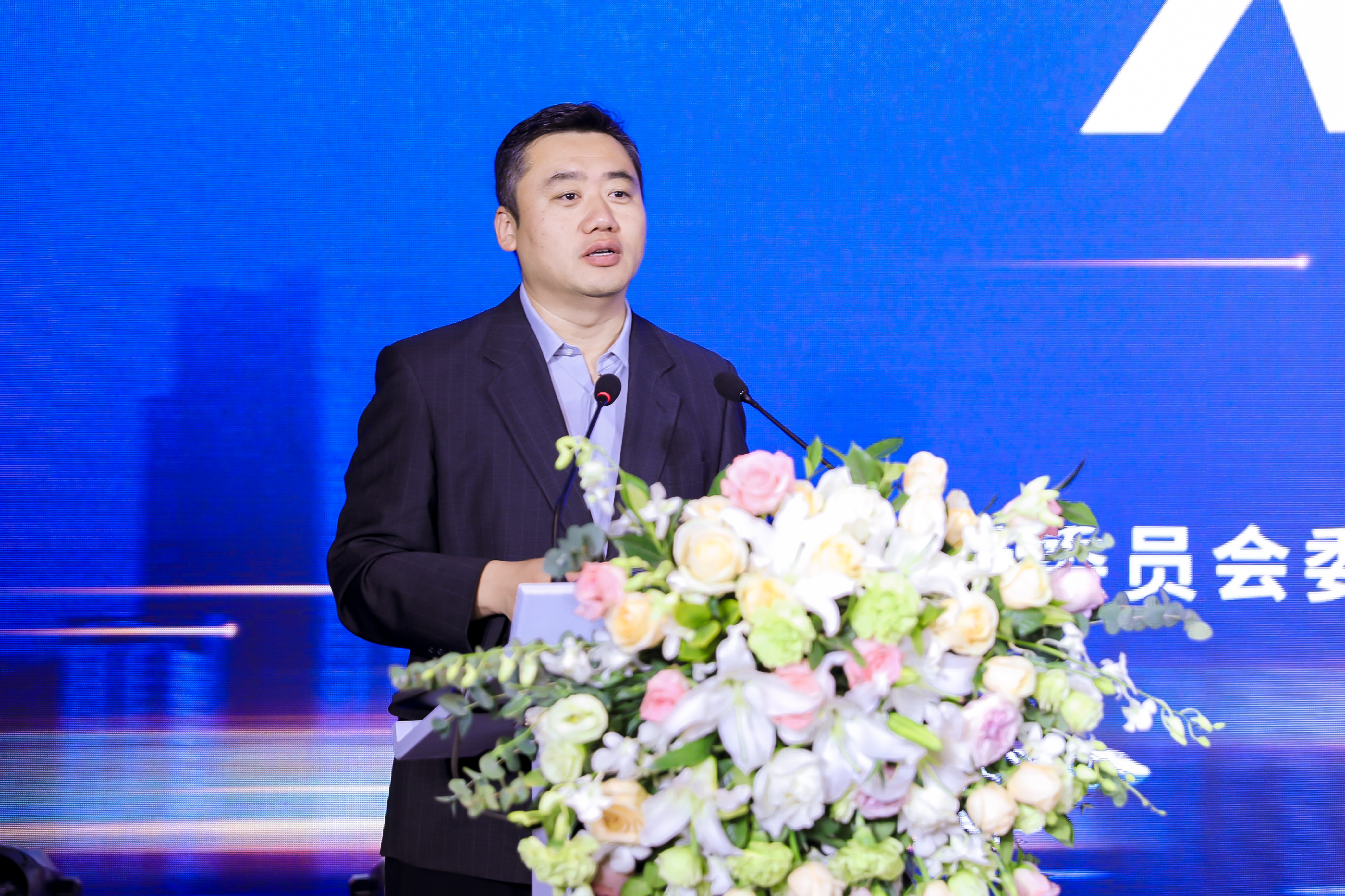
Yan Ding, Director of the State Environmental Protection Key Laboratory of Vehicle Emission Control and Simulation at the Chinese Research Academy of Environmental Sciences
In his opening address, Hewu Wang, Director of the CCTP Executive Committee and Director of the Zero Carbon Transportation Research Center at Tsinghua University's Institute for Carbon Neutrality, eloquently highlighted the remarkable achievements and progress made by the CCTP over the past five years. He emphasized the pivotal role played by the CCTP as a dynamic platform that has successfully brought together 26 leading professional think tanks in the industry. Notably, it has orchestrated 21 thematic salons and two major annual conferences, comprehensively covering over 80 cutting-edge topics ranging from new energy vehicles to dual credit policies and electric vehicle charging infrastructure.
Moreover, he reaffirmed the unwavering dedication of the CCTP to its mission. He underscored the organization's steadfast commitment to national policies, addressing pivotal issues in the realm of clean transportation, fostering deeper local collaboration and research initiatives, and enhancing international exchange and influence. With this resolute dedication, the CCTP continues to spearhead the advancement of clean transportation and propel sustainable development to the forefront.

Hewu Wang, Director of the Zero Carbon Transportation Research Center at the Tsinghua University Institute for Carbon Neutrality
Director Rui Wu, from the Environmental Resources Department at the Transport planning and Research Institute Ministry of Transport, delivered a keynote speech on the progress and considerations regarding the zero-emission transformation in the transportation sector in China, focusing on both policy and practice. In terms of policy, he emphasized the clear positioning of the national top-level transportation strategy for green development. The "1+N" policy framework for peak carbon emissions and carbon neutrality has provided specific task assignments for the transportation sector. These tasks have been effectively integrated into the "14th Five-Year Plan," ensuring a coherent connection between specialized policies in transportation structure, green mobility, transportation equipment, infrastructure construction, and security systems.
Regarding practice, he highlighted the continuous emergence of innovative practices in areas such as new energy vehicles, ships, green and low-carbon infrastructure, and new mechanisms. Finally, he mentioned that the zero-emission transformation in transportation still faces various challenges. It requires balancing development and emissions reduction, considering both overall and local perspectives, and addressing long-term and short-term goals, as well as managing the relationship between government and the market. To actively and prudently advance the transformation, he emphasized the importance of conducting detailed policy investigations and research, strengthening interdepartmental coordination, enhancing technological research and development, valuing the role of industry data, actively conducting pilot demonstrations, and vigorously expanding funding channels.
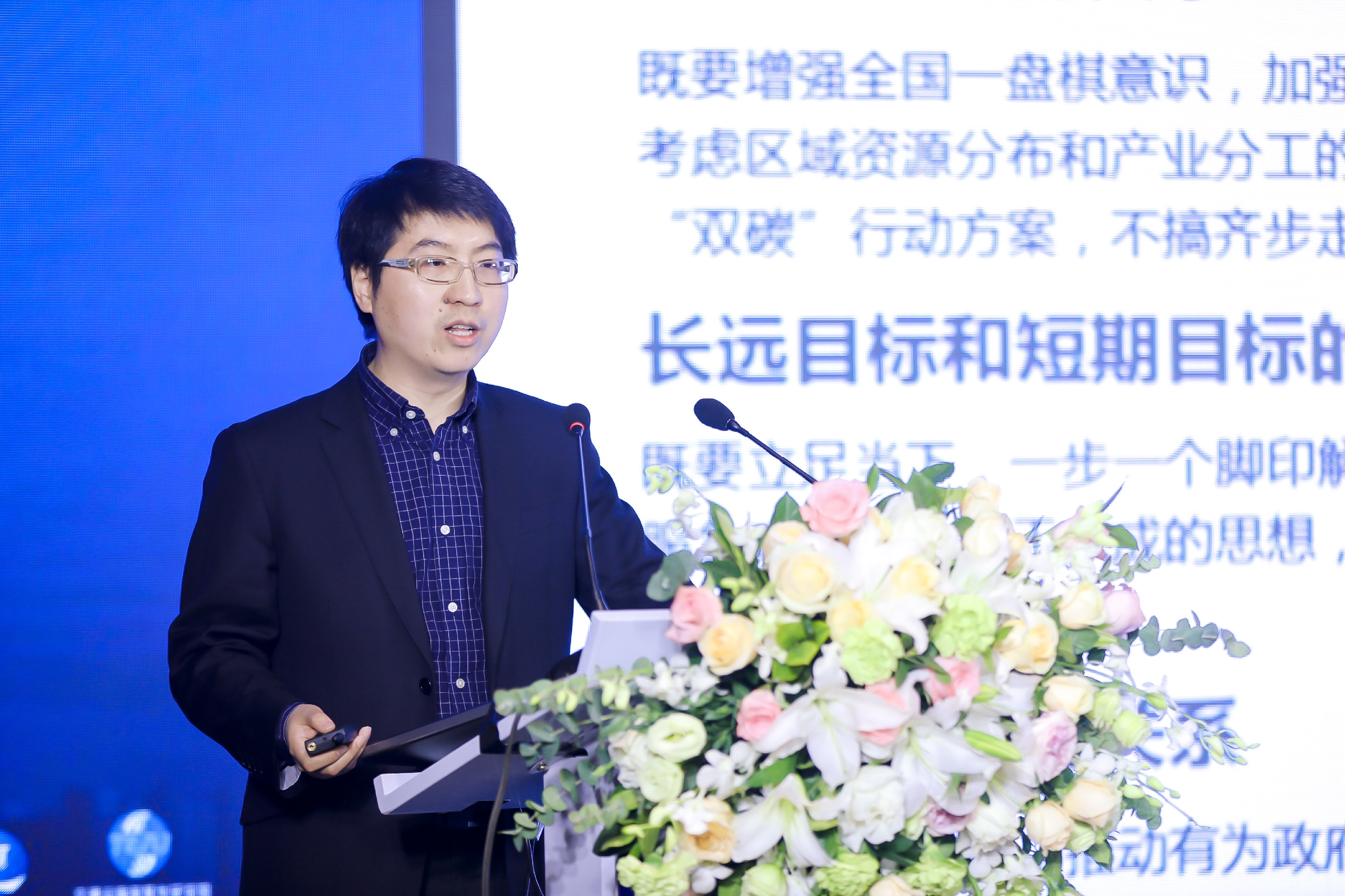
Rui Wu, Director of the Environmental Resources Division at the Transport planning and Research Institute Ministry of Transport
In his keynote speech titled "Outlook on the Development of Zero-Emission in China's Automotive Industry," Bin Liu, member of the CCTP Executive Committee, Chief Expert at the China Automotive Technology Research Center, and Deputy Director of China Automotive Engineering Research Institute, highlighted the progress and challenges in the development of zero-emission in China's automotive industry. With the widespread adoption of new energy vehicles, both the penetration rate and the total number of new energy vehicles are expected to steadily increase. However, Liu Bin also acknowledged the existing challenges such as intense competition in the new market segment, limited revenue growth despite the increase in the number of domestic new energy vehicle manufacturers, and the lack of profitability.
To address these challenges, he emphasized that reducing the green premium associated with new energy vehicles is crucial for achieving zero emissions. In this regard, he proposed targeted recommendations from both the enterprise and policy perspectives. These recommendations aim to address the practical difficulties and promote the sustainable development of the industry.
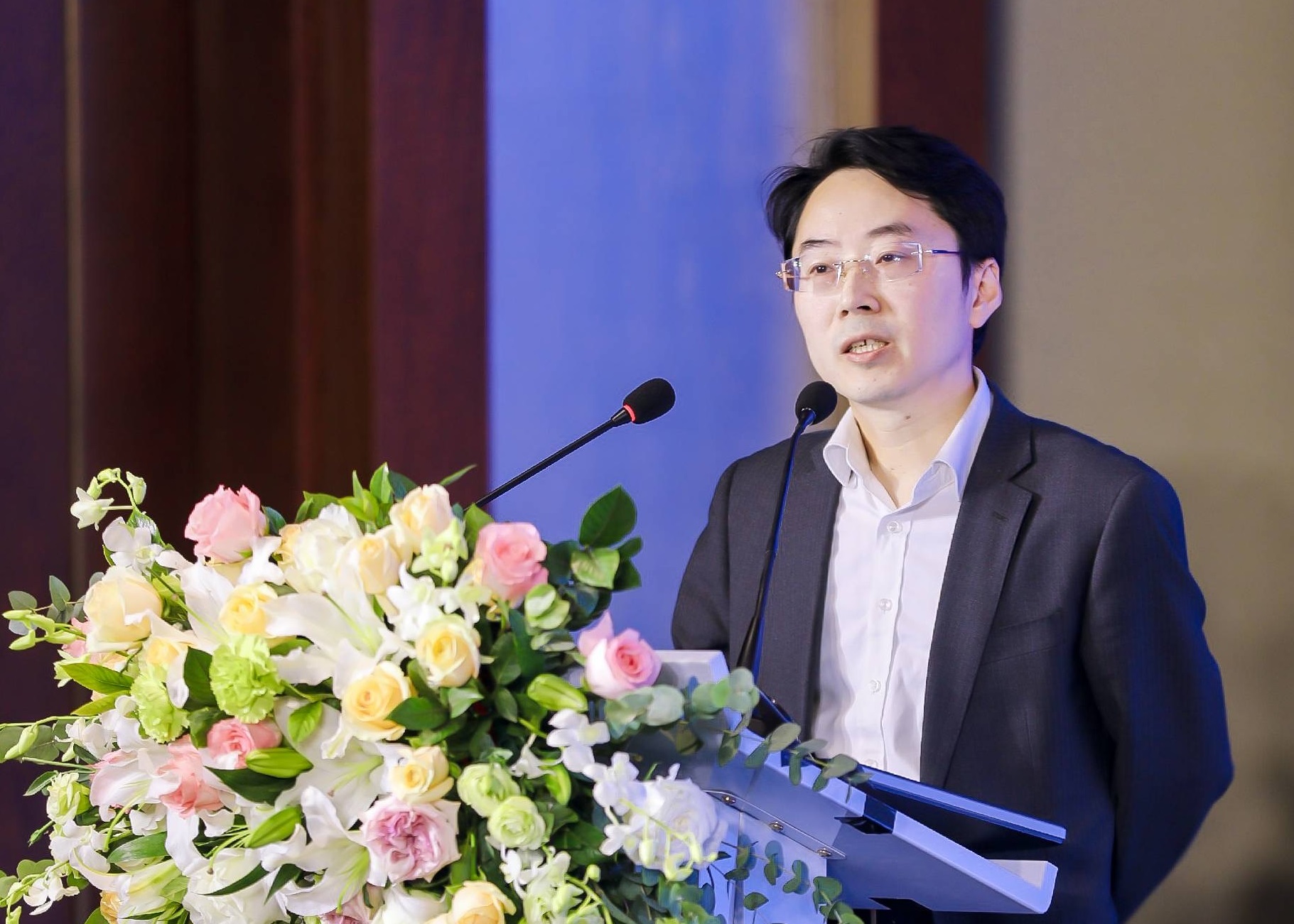
Liu Bin, Chief Expert of China Automotive Technology Research Center and Deputy Director of China Automotive Policy Research Center
In his keynote speech titled "Global Development and Prospects of Zero-Emission Transportation," Daizong Liu, Director of the Sustainable Cities Department and Director of the Communication Department at the World Resources Institute China, highlighted the significant role of the transportation sector in global greenhouse gas emissions. He emphasized that transportation is the second-largest emitter of greenhouse gases worldwide, with road transportation being the largest contributor to these emissions. He further stressed that the transportation industry has reached a point where there is no room for increasing carbon dioxide emissions. Without the active participation of the transportation sector, achieving the global "dual-carbon" goals would be impossible.
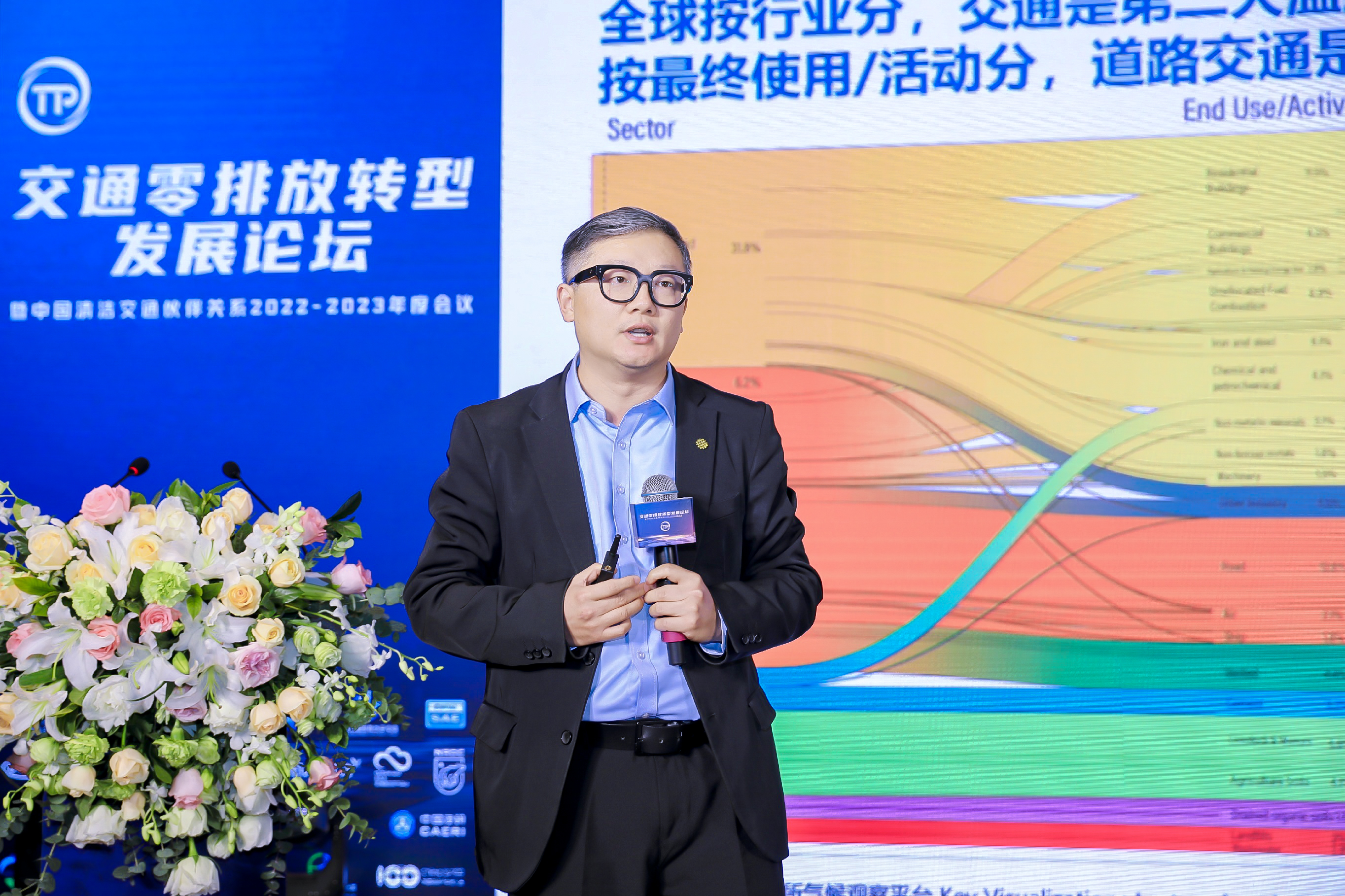
Daizong Liu, Director of the Sustainable Cities Department and Director of the Communications Department at the World Resources Institute China
Unveiling of the "Blue Book on Zero-Emission Transformation in China's Transportation" marked a significant moment during the forum. Dr. Feng An, Executive Director of the CCTP and Executive Director of the Innovation Center for Energy and Transportation, provided a comprehensive overview of the blue book. Comprising eight chapters and 50 Q&A sections, the "Blue Book" brilliantly presented the most cutting-edge and representative topics in the field of transportation. It systematically examined the current status, methods, and challenges of China's green and low-carbon transformation in the transportation sector.
Through in-depth analysis of advanced domestic and international cases, the "Blue Book" provided valuable insights for China's transportation sector in its low-carbon transformation journey. It aimed to assist in achieving continuous decarbonization by shedding light on the progress and challenges faced. The "Blue Book" received high praise and recognition from the participating experts, being hailed as a comprehensive source of knowledge on China's zero-emission transformation in the transportation field. It was regarded as an invaluable resource, comparable to a "ChatGPT" for zero-emission transformation in China's transportation sector.
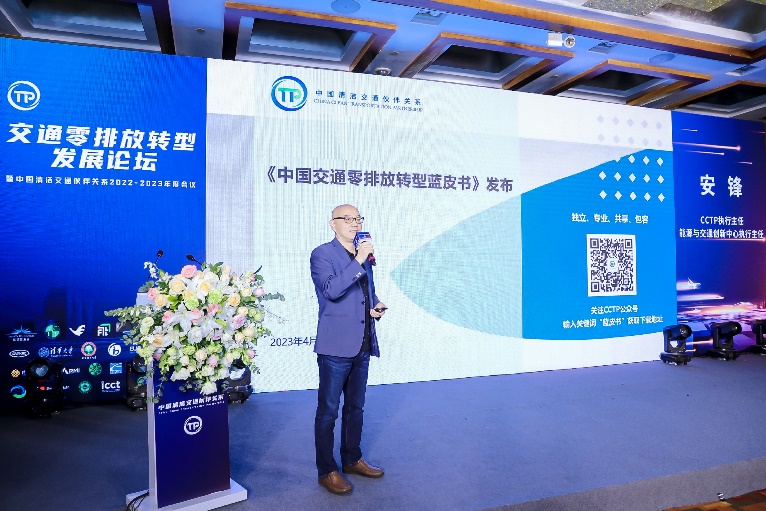
On-site release of the "Blue Book on Zero Emission Transformation in China's Transportation Sector"
The Roundtable Forum
The roundtable forum session was chaired by Lu Fu, member of the CCTP Executive Committee and Chief Representative of the Clean Air Asia in China. Distinguished panelists included Feng An, Executive Director of the Innovation Center for Energy and Transportation; Huiming Gong, Senior Program Director of the Energy Foundation's Transportation Program; Jie Guo, Deputy Director of the International Transportation Research Institute at the Global Sustainable Transport Innovation and Knowledge Center; Wanli Li, member of the China Association of Automobile Manufacturers and former Deputy Inspector of the Ministry of Industry and Information Technology's Industrial Policy Department; and Yongdong Liu, Deputy Secretary-General of the China Electricity Council and Director of the Standard Management Center.
During the session, the panelists provided insightful comments on the "Blue Book" and engaged in enthusiastic discussions on related issues.
Feng An proposed that while countries worldwide have set goals for energy conservation and emission reduction, China is leading the world in the electrification of public transportation, and its development model is worth promoting and applying on a global scale.
Huiming Gong pointed out that China's development of new energy vehicles has been rapid, and the experiences of developed countries, which are based on internal combustion engines as the core power mechanism, may not be directly applicable to China. He explained that the timing of carbon peaking in transportation is determined by light-duty vehicles, the rate of carbon emission reduction after peaking is influenced by heavy-duty vehicles, and the baseline for future carbon reduction depends on ships and aircraft. He emphasized that China's transportation sector has the potential not only to achieve the 30-60 targets but also to play a more proactive leading role.
Jie Guo stressed the importance of market and enterprise demand for the sustainable development of the new energy vehicle industry. He also emphasized that future policy planning and deployment should place more emphasis on technological research and development and capacity building.
Wanli Li mentioned that the official report from the Central Economic Work Conference in December 2021 clearly stated that the gradual phasing out of traditional energy should be based on the establishment of secure and reliable alternatives in new energy. Therefore, achieving efficiency (industrialization), scale (commercialization), and profitability (marketization) in the new energy vehicle industry should be important goals for its development in the next three years.
Yongdong Liu pointed out that the power industry, as the foundation and starting point for energy conservation and emission reduction, faces significant pressure. He emphasized that determining the technological roadmap for the construction of electric vehicle charging and swapping infrastructure over the next three years is a key issue for the high-quality development of such infrastructure.
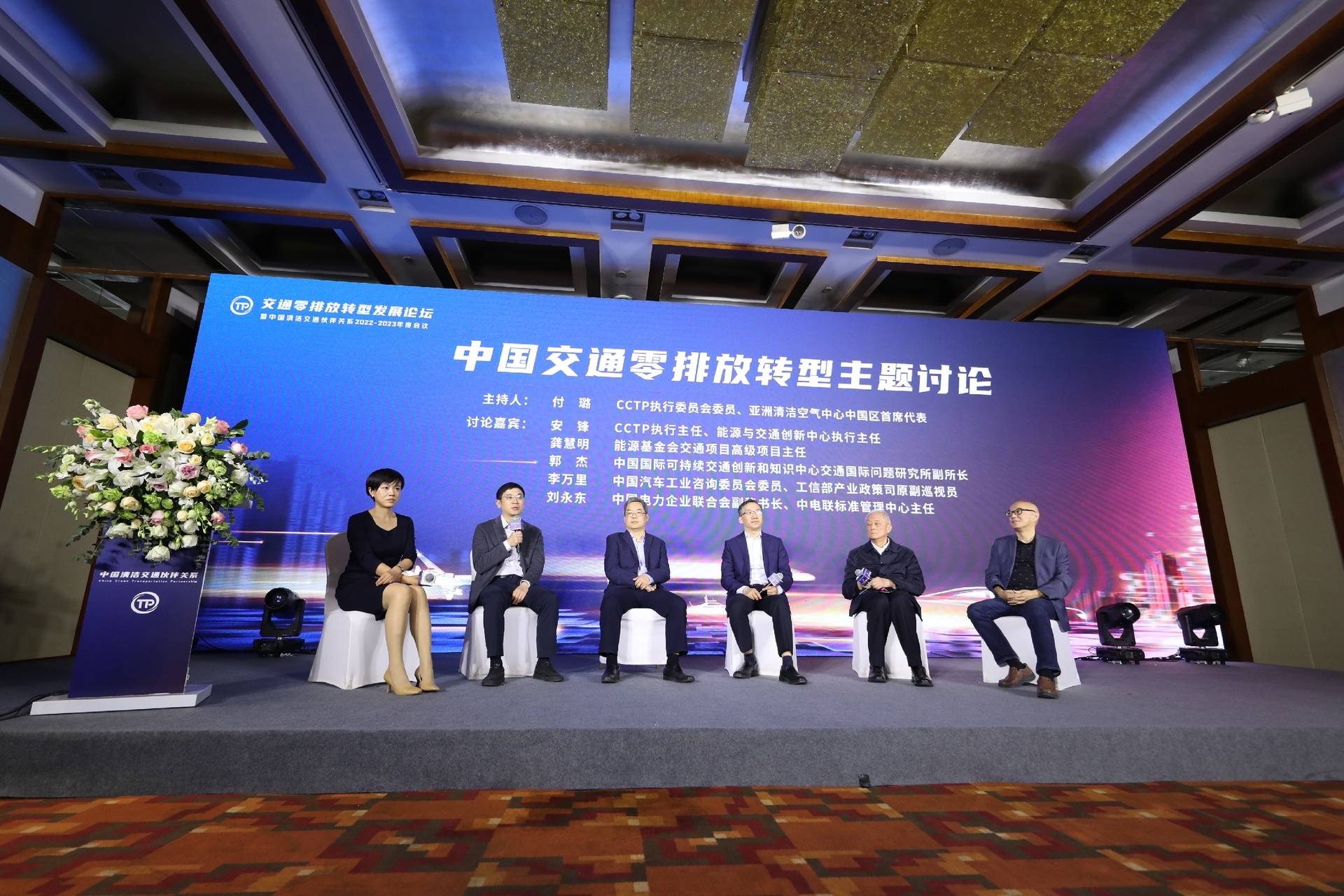
In the roundtable discussion session, Lu Fu, Jie Guo, Huiming Gong, Yongdong Liu, Wanli Li, and Feng An (from left to right) participated.
The Thematic Forum
The annual conference featured two thematic forums and two roundtable discussion sessions.
The theme of the first sub-forum was "Collaborative Transformation for Zero Emission in Multiple Fields." It explored the collaborative development of zero-emission transportation from the perspectives of energy grids, scientific research, key resources, and digitization. The forum was moderated by Hewu Wang, Executive Director of the CCTP Executive Committee and Director of the Institute for Carbon Neutrality Zero Carbon Transportation Research Center at Tsinghua University. The keynote speeches were delivered by Zhiyu Tian, Executive Director of the Sustainable Development Research Center at the Energy Research Institute of the National Development and Reform Commission; Huan Liu, Executive Committee Member of the CCTP, Tenured Professor and Ph.D. Supervisor at the School of Environment, Tsinghua University; Xin Sun, Chief Expert at the China Automotive Technology Research Center; and Danyang Yu, Director and Associate Researcher of the Information Center of the China Academy of Transportation Sciences.

Zhiyu Tian, Huan Liu, Xin Sun, and Danyang Yu respectively delivered thematic speeches.
The roundtable discussion session was chaired by Hewu Wang. The Chief Researcher of the China Waterborne Transport Research Institute, Chuansheng Peng; the Director of Business Development for Air BP in China, Huan Wang; the Deputy Secretary-General of the Renewable Energy Committee at the China Association of Circular Economy, Weiquan Wang; the Climate Action Director of Cathay Pacific Airways Limited, Ziheng Xing; and the Researcher at the China Academy of Railway Sciences, Xinjun Zhou, participated in a profound discussion on the topic of "Accelerating Zero Emission Transformation in Non-Road Transportation." The discussion focused on aviation, railways, water transport, and renewable energy.
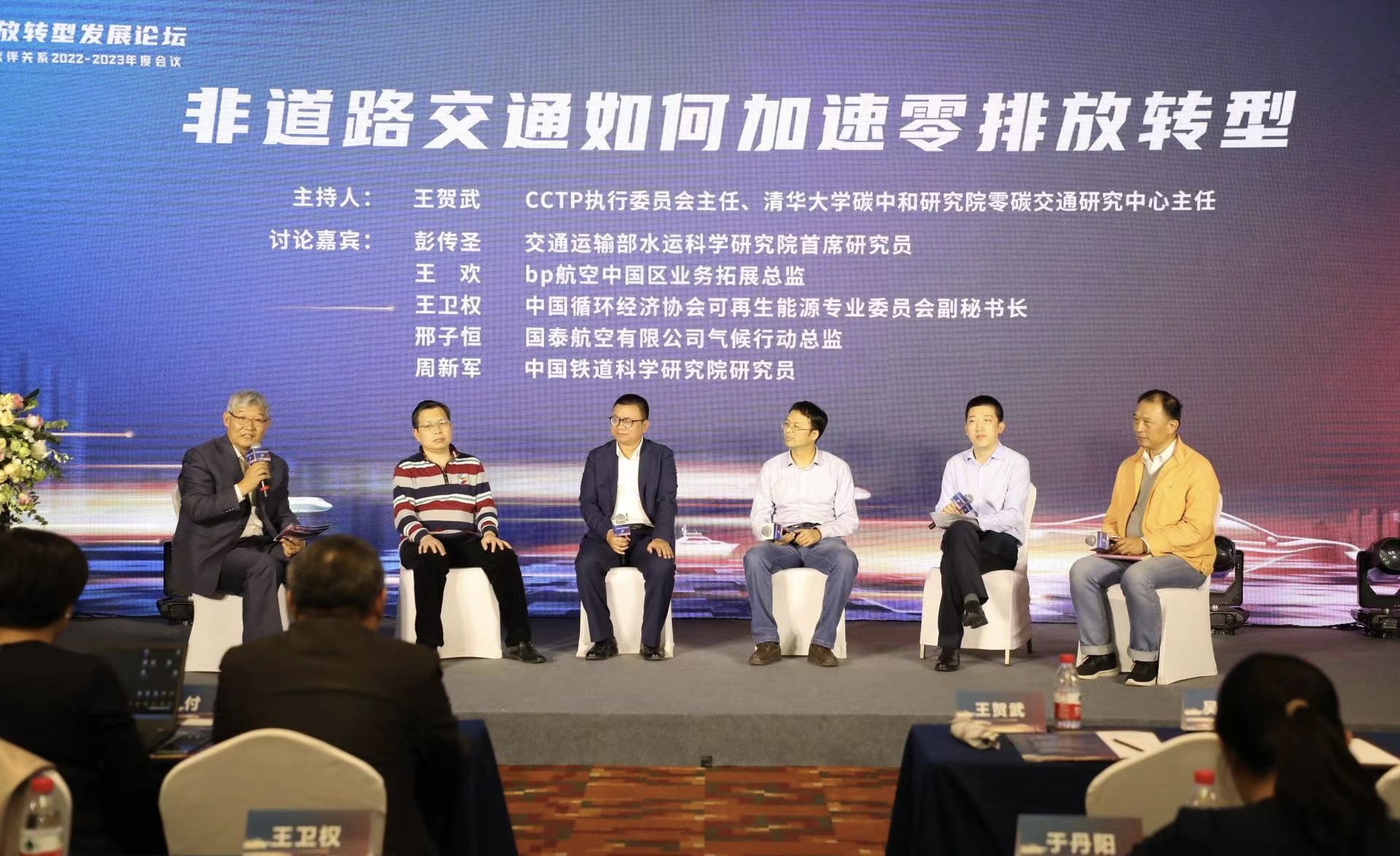
Hewu Wang, Xinjun Zhou, Ziheng Xing, Weiquan Wang, Huan Wang, and Chuansheng Peng (from left to right) participated in the discussion.
The second sub-forum, themed "Progress in Regional Zero Emission Transformation of Transportation," was chaired by Professor Ye Wu from the School of Environment at Tsinghua University. Distinguished speakers included Jiandong Qiu, Director of the Traffic Information and Modeling Institute at Shenzhen Urban Transport Planning Center Co., LTD, Lanzhi Qin, Clean Transportation Project Manager at the Innovation Center for Energy and Transportation, Jing Yang, Director of Commercial Vehicle Research at the Strategy and Planning Department of the China Society of Automotive Engineers, and Hongyang Cui, Senior Researcher at the International Council on Clean Transportation. They presented their insightful perspectives on topics such as urban transportation planning, the path to achieving net-zero emissions in the Guangdong-Hong Kong-Macao Greater Bay Area's road transport, strategies for emissions reduction in regional commercial vehicles, and the development of low/zero emission zones in cities.

Jiandong Qiu, Lanzhi Qin, Jing Yang, and Hongyang Cui respectively delivered thematic speeches.
The theme of the roundtable discussion session was "Measures and Management for Leading Green and Low-Carbon Urban Travel." Xiaohua Ding, a committee member of the CCTP and former Deputy Director of the Shanghai Electric Vehicle Public Data Collecting and Monitoring Research Center, served as the moderator. Changcheng Kan, Vice General Manager of Baidu Intelligent Vision; Lei Li, Senior Engineer at the China Academy of Transportation Science; Genger Yu, Director of Public Affairs at Meituan's Cycling Division; and Yubo Zhai, General Manager of the ESG and Carbon Neutrality Division at Nenglian, engaged in in-depth discussions on topics such as slow-moving transportation and shared cycling.
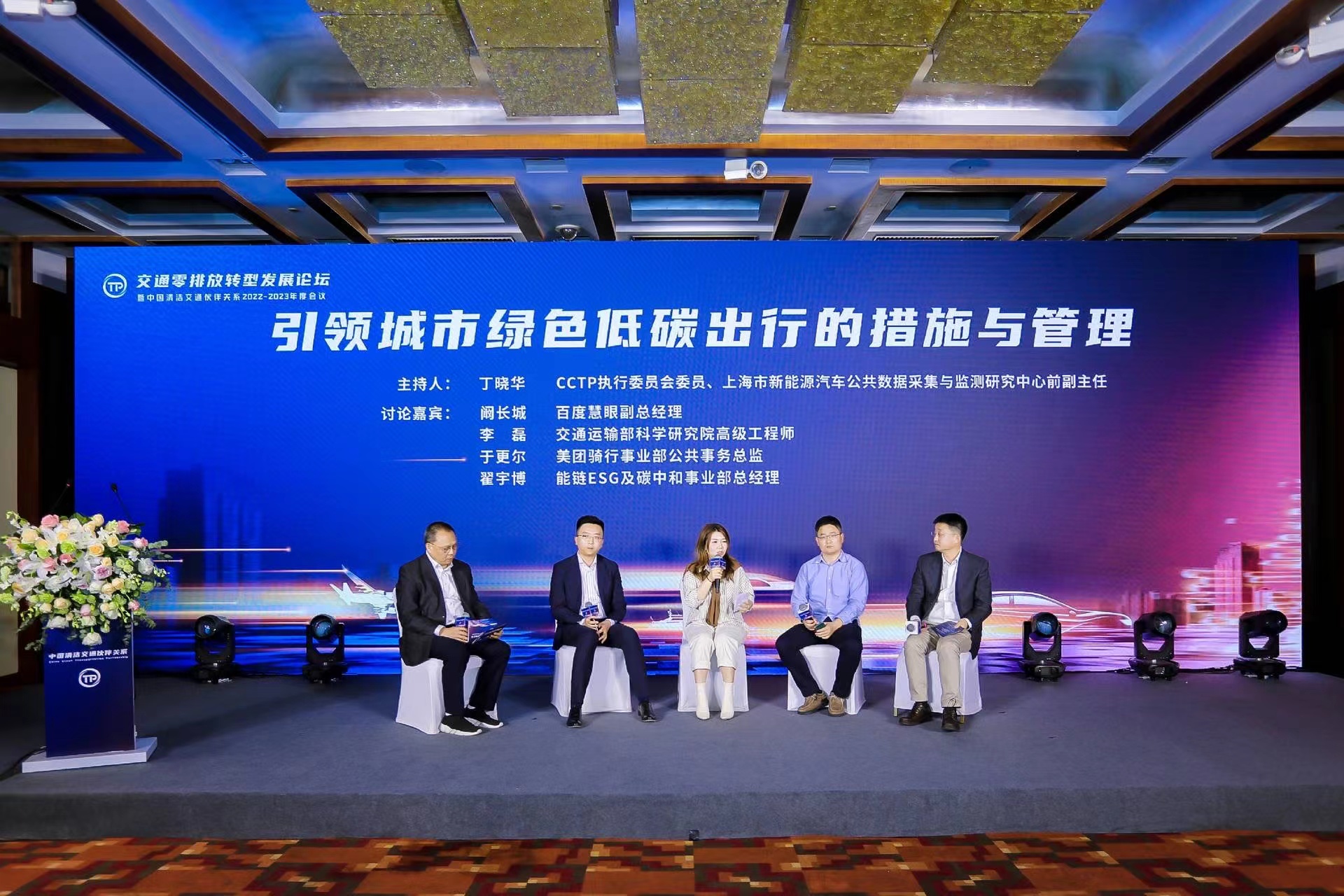
Xiaohua Ding, Yubo Zhai, Genger Yu, Changcheng Kan, and Lei Li (from left to right) participated in the discussion.
At the conclusion of the event, Feng An, the Executive Director of CCTP and the Executive Director of the Innovation Center for Energy and Transportation, provided a comprehensive summary of the remarks made by the participating experts and guests. He expressed sincere gratitude for their insightful contributions and efficient engagement throughout the event. Finally, Feng An extended his appreciation to the forum organizers, acknowledging and commending the remarkable achievements and dedication of the CCTP Secretariat and all the staff involved.

CCTP is a non-governmental, non-profit, and voluntary platform, focusing on policy and technological innovations, summarizing and disseminating national and global practices for a net-zero transportation sector.